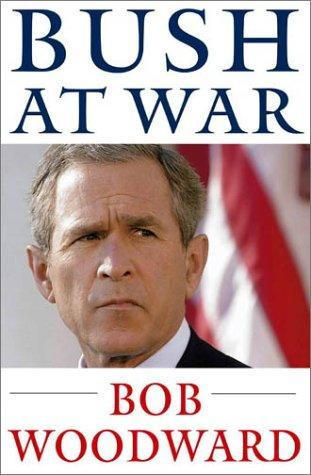
Bush at War
کتاب های مرتبط
- اطلاعات
- نقد و بررسی
- دیدگاه کاربران
نقد و بررسی

November 1, 2002
Quoting liberally from transcripts of National Security Council meetings and hundreds of interviews with those in the presidential inner circle, including four hours of interviews with Bush himself, the Washington Post assistant managing editor, best-selling author and Watergate muckraker manages to provide a nonpartisan account of the first 100 days of the post September 11 war on terror. While Condoleezza Rice, Colin Powell, President Bush and CIA Director George Tenet are impressive, Donald Rumsfeld and Deputy Defense Secretary Paul Wolfowitz come off as hawkish and reactionary, repeatedly calling for a strike against Iraq in the first days of the conflict while pushing for a more widespread, global war. Woodward does an excellent job of exposing the seat-of-their-pants planning sessions conducted at the highest levels of power and the hectic diplomacy practiced by Powell and Bush in trying to get the air war against Afghanistan off the ground. He also brings to light the divisions among the planners concerning the bombing in Afghanistan, which made little impact until late in the game, when the Taliban lines were finally hit. In addition to recounting the heated arguments about when and how to retaliate against Al Qaeda, Woodward also follows Special Ops agents flown into Afghanistan with millions in payoff money weeks in advance of any other American presence. Living in harsh conditions with little to no support, these "110 CIA officers and 316 Special Forces personnel," in this account, ran the show, and effectively won the war with their intelligence gathering operations. While at times relying a bit too heavily on transcribed conversations, Woodward nonetheless offers one of the first truly insightful and informative accounts of the decision making process in the war on terror. 16 pages of b&w photos.

December 15, 2002
Quoting liberally from transcripts of National Security Council meetings and hundreds of interviews with those in the presidential inner circle, including four hours of interviews with Bush himself, the Washington Post assistant managing editor, best-selling author and Watergate muckraker manages to provide a nonpartisan account of the first 100 days of the post September 11 war on terror. While Condoleezza Rice, Colin Powell, President Bush and CIA Director George Tenet are impressive, Donald Rumsfeld and Deputy Defense Secretary Paul Wolfowitz come off as hawkish and reactionary, repeatedly calling for a strike against Iraq in the first days of the conflict while pushing for a more widespread, global war. Woodward does an excellent job of exposing the seat-of-their-pants planning sessions conducted at the highest levels of power and the hectic diplomacy practiced by Powell and Bush in trying to get the air war against Afghanistan off the ground. He also brings to light the divisions among the planners concerning the bombing in Afghanistan, which made little impact until late in the game, when the Taliban lines were finally hit. In addition to recounting the heated arguments about when and how to retaliate against Al Qaeda, Woodward also follows Special Ops agents flown into Afghanistan with millions in payoff money weeks in advance of any other American presence. Living in harsh conditions with little to no support, these "110 CIA officers and 316 Special Forces personnel," in this account, ran the show, and effectively won the war with their intelligence gathering operations. While at times relying a bit too heavily on transcribed conversations, Woodward nonetheless offers one of the first truly insightful and informative accounts of the decision making process in the war on terror. 16 pages of b&w photos.
Copyright 2002 Library Journal, LLC Used with permission.

December 15, 2002
Those who've caught Woodward making one of his innumerable publicity appearances have probably heard the juiciest parts of his look at the Bush administration's response to the events of September 11: the rivalry between Colin Powell and Donald Rumsfeld; the way war with Iraq came up almost from the first; the president's proclamation that he's a gut player who believes in fate. Throughout, Woodward uses a straight reportage style incorporating information from National Security Council meetings (no word on how he obtained those) and many interviews, including several hours of talks with the president. He makes no evaluations of the events he's writing about, nor does he add much to the narrative in the way of background information. Sometimes, this is a detriment. For instance, what are readers to make of the anecdote in which a CIA operative is told to bring Osama bin Laden's head home in a box? Was this for real? Apparently so, since the operative took a cardboard box and dry ice with him. As with other of Woodward's books, he finds himself in strange places--for instance, inside the head of Condoleezza Rice as she prepares for bed--but mostly this follows the events in chronological order, giving the view of the action from many sides, although those who cooperated the most with Woodward, such as Powell and Bush himself, seem to come out looking the best.(Reprinted with permission of Booklist, copyright 2002, American Library Association.)

























دیدگاه کاربران